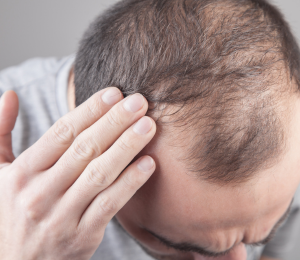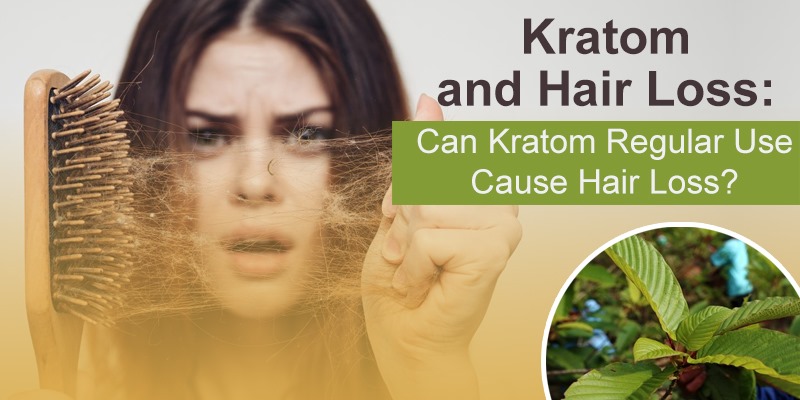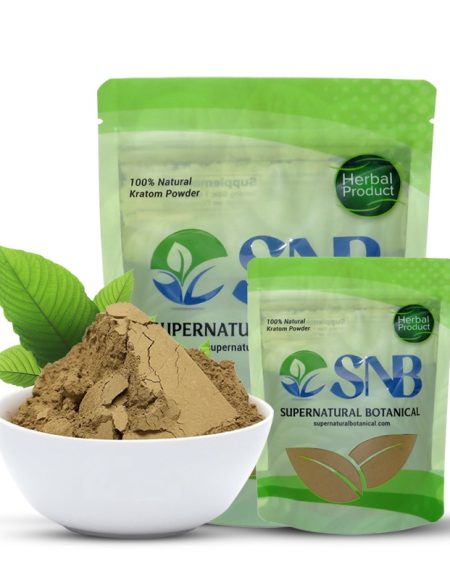Hair loss is a normal aging process that becomes prominent with increasing age. However, it can also result from an underlying medical condition, nutrient deficiency, or the use of some drugs or medications. One such drug is Kratom which has recently gained massive popularity and has been reported to cause hair loss.
Kratom (Mitragynine Speciosa) is widely used in the USA and is sworn upon by many users due to its soothing and energizing effects on the body.
Table of Contents
While it may have several benefits, Kratom also has its share of unwanted effects. Among these side effects, its propensity to cause nausea when used in high doses has been firmly established even by the die-hard fans of Kratom.
However, some users have also reported a few side effects of the herb (i.e., hair loss) that may or may not be a myth.
In this article, we’ll discuss whether or not Kratom leads to hair loss and if there’s any evidence that suggests otherwise.
How Does Kratom Work?
Kratom is a plant that grows in Southeast Asia. It has been used for thousands of years as herbal medicine to treat pain and improve mood.
The active ingredients of kratom are mitragynine and 7-hydroxymitragynine, which can bind to receptors in the brain’s reward circuitry.
Although these compounds have similar effects to some relieving remedies, there is no risk of overdose if you take less than what is recommended.
Does Kratom Really Cause Hair Loss?
As of now, no evidence suggests that Kratom causes hair loss. The reason for limited evidence is that Kratom is not entirely legal across the US. Hence not enough research to provide a reasonable answer.
However, according to some reports published on internet platforms like Reddit, users have experienced some hair loss as a side effect of consuming Kratom.
According to one report:
“I had read about Kratom on Reddit but didn’t try it. About 6 months after reading about it, a friend mentioned that her bf took it for his mental health. I noticed about a month ago that my hair was falling out at an alarming rate. I’ve tried everything this last month, masks and treatments, and was still confused because it’s falling out from the root. Something jiggled in my brain yesterday, and I remembered reading about hair loss and Kratom on Reddit a long, long time ago.”
Having said this, it is also likely that people may be experiencing hair loss because of other conditions and not Kratom. These conditions can be normal ageing, other medications, or underlying health problems.


What is the Theory Behind Kratom Hair Loss?
Even though Kratom has gained raving popularity, research is still scarce on this herb, and there are only a few established facts so far.
Whatever information there is about Kratom is based on anecdotal statements published by internet users. Let’s explore some reports below and see the theories behind them:
Kratom and Testosterone
Some long-term users believe they have experienced low testosterone levels after consuming Kratom. Their symptoms range from low motivation, foggy mind, and reduced energy to decreased libido. However, whether these symptoms are associated with using Kratom is still unclear.
While it’s generally believed that there is a link between Kratom and testosterone, the current research does not support any connection between these two. According to some studies, agonists may increase testosterone conversion, promoting hair loss.
Kratom & Pesticides
Another theory suggests that a Selenium-based pesticide sprayed on Kratom farms may lead to hair loss. But this also lacks scientific evidence, and there is no mention of commercial crops that use this spray.
To avoid this, it’s important to check the lab reports provided by Kratom vendors to check the ingredients and see if the herb is contaminated with pesticides.
Immunostimulant effects of Kratom
One of the benefits of Kratom is its effect as an immunostimulant. This means that it has the power to amplify your immune system, which can be helpful to resist infections and help the body recover and heal quickly.
However, using Kratom for this benefit only works if you’re not overstimulating your immune system because it may lead to increased inflammation in your body. Though inflammation is a normal immune response to an injury or damage, excessive or unnecessary inflammation can lead to serious problems.
Coming to our main point, if your scalp faces increased inflammation due to Kratom, it may eventually lead to hair loss because your immune cells will attack the hair follicles on your scalp. That said, this is just another theory behind Kratom and hair loss, and we can’t know if users are more likely to experience it.
What Are The Causes of Hair Loss?
Hair loss is a common phenomenon in both men and women, and many factors can cause hair loss. Below are some common reasons that lead to hair fall:
Medications
Following are some common drugs and supplements that may cause hair loss as a side effect:
- Antifungals
- Antibiotics
- Vitamin A
- Immunosuppressants
- Anti-coagulants
- Mood stabilizers
- Hormone therapy drugs
- Beta-blockers
- Anti-epileptic drugs
Stress
Stress can affect your immune system, which in turn can affect the production of hormones that control growth and development. It also leads to the release of certain hormones, including testosterone, that causes hair follicles on your scalp to shrink or stop producing hair.
Stress-related hair loss can be caused by many factors, including:
- Excessive sweating
- Caffeine consumption
- Lack of sleep
- Poor nutrition
Genes
Your family history and genetic makeup can also increase your chances of hair loss and early baldness. If this is the cause of your hair loss, you can not modify it. Instead, you can change your hair care routine and lifestyle to reduce the severity of hair loss.
Hormonal changes
Change in the level of hormones is a normal process in your body if it occurs within limits and does not lead to abnormal symptoms. There can be a sudden drop in your hormones with age which can lead to baldness. Some people may experience it early in life based on their lifestyle, while others may experience it later as they age.
Are There Any Treatments?
While hair loss can become a cosmetic concern for many people, it’s common, especially with increasing age. The following are some widely used treatments that exist for people going through hair loss:
Hair transplant
Hair transplant surgery involves removing a small strip of the scalp and replacing it with a strip of your own hair to cover gaps in the hairline. It is the only Kratom hair loss permanent solution for male pattern baldness (androgenetic alopecia).
By removing thinning hair from the back of your head, you can prevent further thinning and stimulate growth in areas where you’ve lost hair.
This method takes about two months to complete; however, it usually lasts for only a couple of years.
Laser
With this method, hair follicles are stimulated with a precision laser. People who have recently lost their hair are the only ones who can benefit from this method. Also, the laser cannot stimulate hair growth once again if the follicle is completely inactive.
People who opt for this method can purchase laser therapy machines to use at home. Usually, it takes many treatments over the course of some weeks or months before you start to notice any results.
Drugs
Some medications like Propecia can help prevent hair loss and restore hair growth. Topical Minoxidil works great to stop hair from thinning, while Rogaine has also been reported to help with hair loss.
For damaged hair, Nioxin-based hair products work well to revitalize hair. However, keep in mind that these products are synthetic and may lead to some unwanted effects.
Tips For Reducing The Chances of Hair Loss
If you don’t want to stop using Kratom but want to avoid experiencing hair loss, here is what you can do to consume the herb safely:
Modify your Kratom dose
It’s a good idea to lower your dose and take enough time off between doses if you’re worried about losing your hair. It is generally a good practice to do this. Taking large amounts of Kratom all day long should never become an addiction. To achieve this, you seek alternative treatments that address the underlying cause of the condition you’re trying to manage with Kratom.
Avoid some medications
As we mentioned above, some medications may lead to hair loss. You should cut down or avoid such drugs to reduce the chances of hair fall. These medications include NSAIDs, anti-epileptics, antipsychotics, birth control pills, etc. However, this should not be done abruptly or without the advice of your healthcare professional.
Take vitamins and supplements
Using supplements and vitamins can help improve your health care using Kratom. Here are some popular vitamins and supplements that are effective in preventing hair loss:
- Iron
- Fish oil or omega-fatty acid supplement
- Biotin
- Moringa
- Vitamin B12
- Silica
- Calcium
Modify your lifestyle and stay stress-free
Stress can take a toll on your body and cause hair loss, but there are ways to prevent it from happening.
The first thing you can do is try to relax and be more mindful of your stress levels. The second thing you can do is figure out what’s behind your stress levels. Are you stressed because of work? Are you worried because of your studies?
Whatever the cause, try to modify your stress levels by practicing meditation, incorporating physical activity, and eating healthy foods.
Go for hair restoration
If nothing else seems to work and you can’t identify the underlying cause of your hair loss, you can opt for hair restoration therapy. Hair restoration therapy is a medical treatment that can help prevent hair loss by stimulating the growth of new hair follicles on the scalp. This method is often used to treat hereditary baldness and hair loss caused by illness or injury.
Final Thoughts
When used in high doses, Kratom might cause hair loss, but there is a lack of evidence supporting this theory. Even though there are some theories, it’s likely a myth. Ensure you consume Kratom within suggested limits to enjoy this natural herb.


Kate Freeman is the wellpreneur behind Kratomguides.com, an informative blog focused on spreading the goodness of Mitragyna Speciosa. Kate supports scientific research on this natural tree “Kratom” and believes that this herb can help millions of people to live a healthier life. She works with many kratom vendors to help extend their brand influence online. In her spare time, she enjoys gardening, cooking, trying new recipes, and locating reliable stores selling kratom on sale.




















